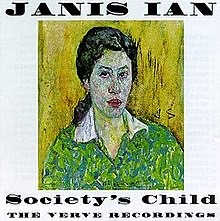Difference between revisions of "Society’s Child (1965)"
| Line 17: | Line 17: | ||
== Background == | == Background == | ||
| + | The lyrics of the song center on the feelings of a young girl who witnesses the humiliation that her African American boyfriend receives from the girl's mother and the taunts that she herself endures from classmates and teachers. It closes with her decision to end her relationship with the boyfriend because of her inability to deal with the social pressure. This came up from Ian’s personal experience in 1964, where she lived in East Orange, New Jersey. Her neighborhood was predominantly populated by African Americans and she was one of very few whites in her school.<ref>Carl Wiser. [http://www.songfacts.com/blog/interviews/janis_ian/ "Janis Ian interview"]. 14 March 2003. ''Songfacts''. Retrieved February 5, 2021.</ref> | ||
== Live Performance == | == Live Performance == | ||
Revision as of 05:48, 5 February 2021
Society's Child (originally titled Baby I've Been Thinking) is a song written and recorded by American singer-songwriter Janis Ian in 1965. Its lyrics concern an interracial romance – a still-taboo subject in the mid-1960s. Ian was 13 years of age when she was motivated to write and compose the song, and she completed it when she was 14. Released as "Society's Child (Baby I've Been Thinking)", the single charted high in many cities in the autumn of 1966 but did not hit big nationally until the summer of 1967, when it peaked at no. 14 on Billboard's Hot 100.[1]
Key Lyrics
Now, I could understand your tears and your shame
She called you 'Boy' instead of your name
When she wouldn't let you inside
When she turned and said, "But honey, he's not our kind"
She says I can't see you any more, baby
Can't see you anymore
Background
The lyrics of the song center on the feelings of a young girl who witnesses the humiliation that her African American boyfriend receives from the girl's mother and the taunts that she herself endures from classmates and teachers. It closes with her decision to end her relationship with the boyfriend because of her inability to deal with the social pressure. This came up from Ian’s personal experience in 1964, where she lived in East Orange, New Jersey. Her neighborhood was predominantly populated by African Americans and she was one of very few whites in her school.[2]
Live Performance
Reference
- ↑ Society’s Child. Wikipedia. Retrieved February 5, 2021.
- ↑ Carl Wiser. "Janis Ian interview". 14 March 2003. Songfacts. Retrieved February 5, 2021.
